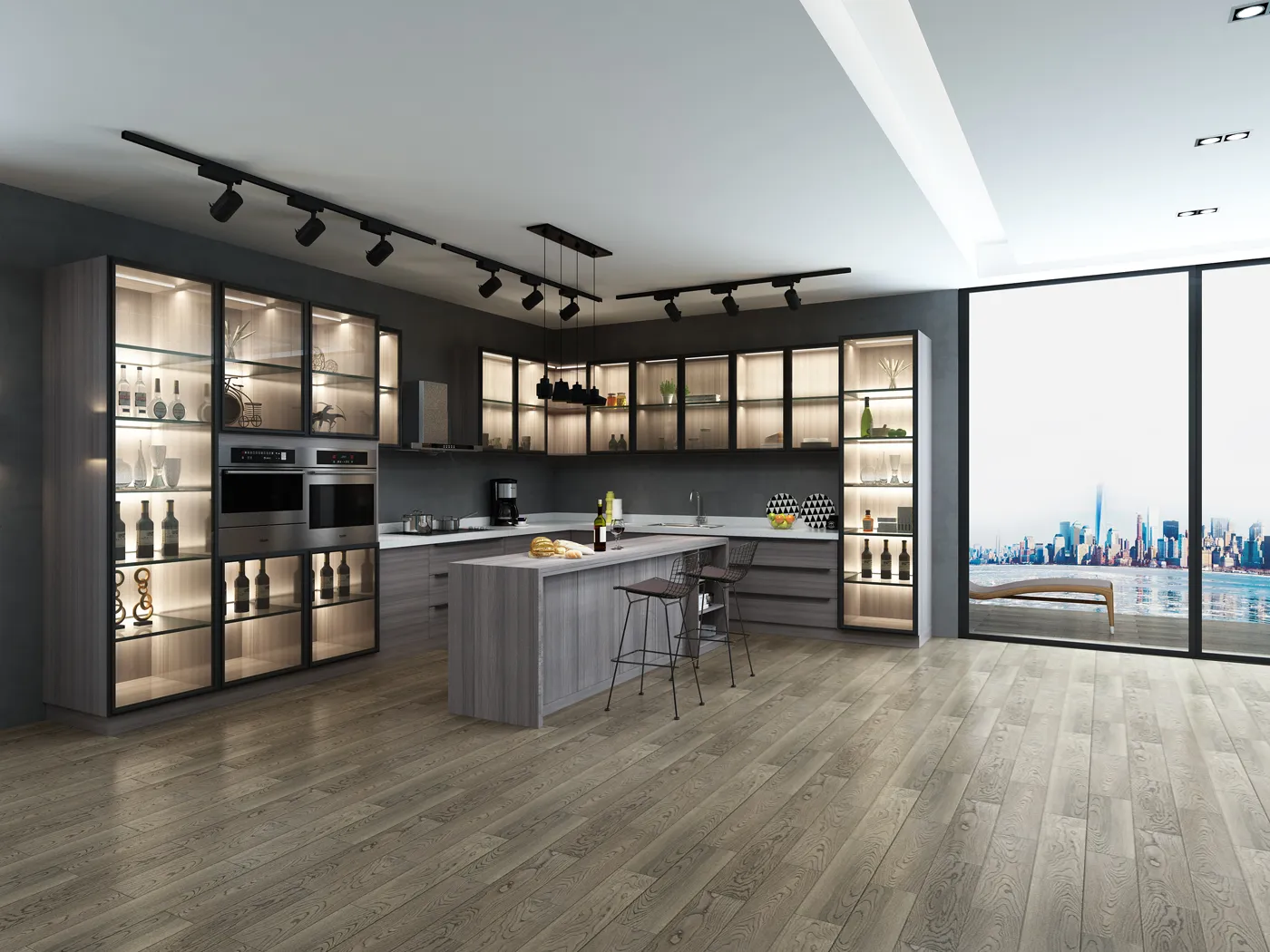
How Do Smart Kitchen Cabinets Improve Energy Efficiency?

Ever walked into your kitchen in the morning to find it warm with the comforting aroma of freshly brewed coffee? Here's the amazing part: your smart cabinets made that happen without wasting energy while you slept. Smart kitchen technology has evolved beyond just convenience - it's now silently revolutionizing how we conserve energy in our homes. From intelligent refrigerators that optimize cooling cycles to ovens that learn your cooking schedule, these innovations work together to shrink energy bills while serving as elegant extensions of our lifestyle.
As a home chef, you know the kitchen is the heart of the home - but it's also often the heart of energy consumption. Smart cabinets and appliances transform this space into an eco-hub that thinks for itself. How? They remember when you typically cook, adjust temperatures based on ingredient types, and even communicate with your utility provider to optimize power usage during off-peak hours. This guide explores how upgrading your kitchen's intelligence saves energy without compromising functionality.
The Intelligent Core of Modern Kitchens
At the heart of every energy-efficient kitchen are smart cabinets with integrated technology. These aren't just ordinary storage spaces - they're active energy managers. Think of them as sophisticated thermal blankets that maintain precise temperatures without constant energy input. Their secret lies in multi-layered insulation that stabilizes interior conditions based on external temperature changes and usage patterns.
Real-Time Energy Tracking
Imagine your cabinet doors displaying a subtle glow when they're operating at maximum efficiency. Advanced models provide live feedback on energy consumption with detailed breakdowns in mobile apps - like a nutrition label for your power use. One customer noted: "Seeing which appliances were energy vampires completely changed how I approach meal prep."
Adaptive Power Modes
Smart drawers automatically switch to eco-mode overnight when unused, while climate-controlled wine cabinets reduce cooling during cooler evenings. This dynamic adjustment based on actual usage patterns creates meaningful savings. One homeowner saved nearly 30% on their monthly electricity after installing adaptive cabinets that automatically enter low-power mode when kitchen motion hasn't been detected for two hours.
Design That Does More
Form meets function in intelligent kitchen design where aesthetic choices contribute significantly to energy conservation. Cabinets designed with passive cooling principles in mind - using breathable eco-friendly building materials and strategic ventilation pathways - need fewer energy-hungry active cooling systems.
Design Pro Tip: When installing smart cabinets, consider positioning refrigeration units away from heat sources like ovens. Even a few extra feet can drastically reduce thermal interference - one homeowner noticed their refrigerator ran 15% less often after relocating.
Space optimization directly impacts energy consumption. Smart corner solutions with efficient pull-outs eliminate dead spaces where cool air would pool and require energy to recirculate. When storage solutions keep ingredients organized and accessible, you're less likely to leave doors open searching for items - which alone can account for 7% of a refrigerator's energy use.
Appliances That Think Ahead
Your smart cabinets communicate with connected kitchen appliances to create a coordinated ecosystem. Refrigerators automatically adjust cooling when cabinets indicate they're storing large gatherings' worth of dishes, while ovens preheat precisely when needed. What does this look like practically?
"Our entire cooking routine changed after installing smart appliances. The coffee maker starts as soon as our smart cabinet detects we've taken out the mugs. The oven begins preheating when the cabinet senses I've pulled out a baking dish. Everything just... works together." — Sarah J., verified user
Integrated Temperature Control
Smart cabinets work alongside appliances to maintain thermal balance. When you open your oven, nearby cabinets will temporarily increase cooling to counteract the heat emission. Some models even detect high-cook days (like holidays) and shift cooling strategies accordingly. As one appliance technician explained: "They're like thermal gatekeepers, redistributing energy rather than wasting it."
Future-Focused Kitchen Tech
The most exciting innovations blend AI with practical energy conservation. Tomorrow's smart cabinets won't just store dishes - they'll plan meals based on food freshness tracked through weight sensors and visual recognition. Several manufacturers are testing systems that coordinate across multiple households to create neighborhood energy profiles that better leverage renewable energy peaks.
For homeowners considering upgrades, the convergence of voice tech and cabinetry brings new hands-free energy management possibilities. Simply saying "lower kitchen power for two hours" will dim lights, raise refrigerator temperatures slightly, and delay dishwasher cycles - all automatically managed through integrated cabinet systems that serve as the central control hub.
Sustainability Bonus: Many smart cabinet manufacturers now use recycled aluminum for frame construction - providing the durable framework for sustainable energy use while reducing overall material waste.
Your Practical Path to Savings
Transitioning to an energy-saving kitchen doesn't require a complete renovation. Start small by adding intelligent storage accessories like sensor-equipped pantry containers that track shelf life. These communicate with smartphone apps to suggest recipes based on items nearing expiration - preventing both food and energy waste.
For those ready for more significant changes, begin with the high-impact appliances: smart refrigerators paired with efficient cabinetry can account for nearly 50% of kitchen energy savings. As you expand, choose devices that communicate using common protocols like Matter to ensure seamless coordination. The right setup learns your habits - for example lowering energy consumption during work hours when you're away.
Real Results, Real Savings
The proof comes from transformed utility bills and reduced environmental impact. During a case study across fifty homes, participants saving less than 15% didn't properly integrate appliances with their cabinetry systems. The winners? Those who embraced full-system thinking and smart scheduling, who achieved an average reduction of 31% in kitchen-related energy consumption over six months.
Beyond dollars saved, these systems contribute meaningfully to household sustainability goals. One compelling statistic: if every home incorporated coordinated smart kitchen technology, we'd eliminate nearly 18 million tons of annual carbon emissions - equivalent to taking three million cars off the road.
Tags:
Recommend Products











